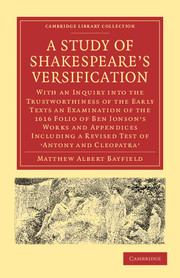 A Study of Shakespeare's Versification
A Study of Shakespeare's Versification Book contents
- Frontmatter
- PREFACE
- Contents
- ERRATA
- I SHAKESPEARE'S VERSIFICATION
- II THE EARLY TEXTS
- CHAPTER III ABOLITION OF RESOLUTIONS AND OTHER ABBREVIATIONS IN THE VERSE: Richard II and Richard III examined
- CHAPTER IV ABBREVIATIONS IN THE VERSE (continued): the Quarto Plays Hamlet, Othello, and Lear examined
- CHAPTER V ABBREVIATIONS IN THE VERSE (continued): the Folio Plays Macbeth, The Tempest, Cymbeline, Coriolanus, Antony and Cleopatra and Julius Caesar examined (Macb. p. 140, Temp. p. 154, Cymb. p. 160, Cor. p. 184, A. and C. p. 204, J. C. p. 226)
- CHAPTER VI ELISION IN THE FINAL FOOT
- CHAPTER VII ON CERTAIN SPELLINGS
- CHAPTER VIII ABBREVIATIONS IN THE PROSE
- CHAPTER IX CONCLUSIONS
- APPENDICES
- THE TRAGEDY OF ANTONY AND CLEOPATRA
- INDEX
CHAPTER VII - ON CERTAIN SPELLINGS
from II - THE EARLY TEXTS
Published online by Cambridge University Press: 01 June 2011
- Frontmatter
- PREFACE
- Contents
- ERRATA
- I SHAKESPEARE'S VERSIFICATION
- II THE EARLY TEXTS
- CHAPTER III ABOLITION OF RESOLUTIONS AND OTHER ABBREVIATIONS IN THE VERSE: Richard II and Richard III examined
- CHAPTER IV ABBREVIATIONS IN THE VERSE (continued): the Quarto Plays Hamlet, Othello, and Lear examined
- CHAPTER V ABBREVIATIONS IN THE VERSE (continued): the Folio Plays Macbeth, The Tempest, Cymbeline, Coriolanus, Antony and Cleopatra and Julius Caesar examined (Macb. p. 140, Temp. p. 154, Cymb. p. 160, Cor. p. 184, A. and C. p. 204, J. C. p. 226)
- CHAPTER VI ELISION IN THE FINAL FOOT
- CHAPTER VII ON CERTAIN SPELLINGS
- CHAPTER VIII ABBREVIATIONS IN THE PROSE
- CHAPTER IX CONCLUSIONS
- APPENDICES
- THE TRAGEDY OF ANTONY AND CLEOPATRA
- INDEX
Summary
Elizabethan spelling being far from fixed, we find a variety of forms for innumerable words, as day, daie—dew, deawe—four, fower—hour, houre, hower—follow, followe—answere, answer—know, knowe—weight, waight, etc. Most of these do not concern us, since they do not affect the metre, but the following are of importance for our present inquiry.
1. Hour, though usually a monosyllable, is occasionally a disyllable, whatever its spelling, as is also our, which is always so spelt. Powre (powrefull) frequently occurs in the Folio, and less often flowre and towre. In the Quartos these spellings are comparatively rare. We may therefore suspect the Folio, knowing its idiosyncrasies as we now do, of desiring to avoid a resolution or double ending by such spellings. On the other hand, the difference in pronunciation is slight, and it is possible that we have a variation employed without any special intention. Nevertheless, the two following cases are decidedly suspicious. Quarto and Folio give in I Henry IV 3. 1. 210,
Sung by a faire queene in a summers bowre,
and in Twelfth Night 1. 1. 41 the Folio has
Love-thoughts lye rich when canopy'd with bowres.
In the other six places where the word occurs we have bowers, both in the Quarto and Folio.
- Type
- Chapter
- Information
- A Study of Shakespeare's VersificationWith an Inquiry into the Trustworthiness of the Early Texts an Examination of the 1616 Folio of Ben Jonson's Works and Appendices including a Revised Test of 'Antony and Cleopatra', pp. 241 - 261Publisher: Cambridge University PressPrint publication year: 2009First published in: 1920
